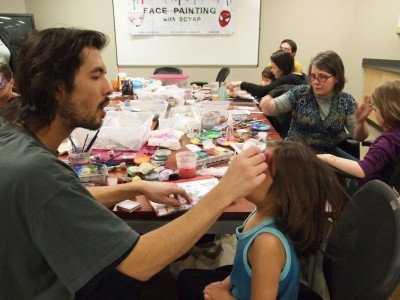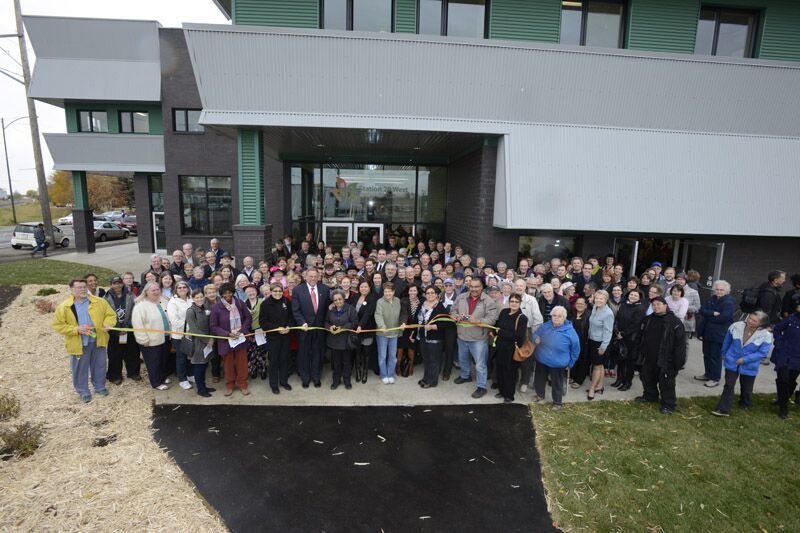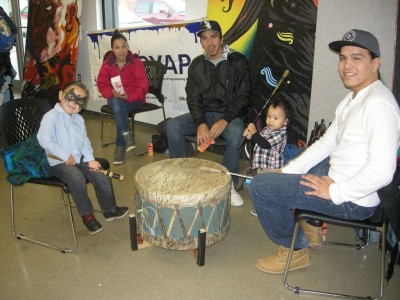by Omar Elsharkawy, CFICE Admin RA
The Community First: Impacts of Community Engagement (CFICE) project has many community partners across Canada and one organization that CFICE’s Poverty Reduction hub has partnered with is Station 20 West. Station 20 West is a Community Enterprise Centre (CEC), located in the heart of Saskatoon’s west-side core neighbourhood, which aims to reduce poverty and build healthy communities through a collaborative community development approach.

A little girl gets her face painted as part of Station 20 West’s community activities. ©Station 20 West
To further understand Station 20 West, I interviewed Lisa Erickson, Manager of Community Engagement at University of Saskatchewan’s Community Engagement Office at Station 20 West, and Colleen Christopherson-Cote, Community Partnership Facilitator for the Saskatoon Poverty Reduction Partnership.
According to Lisa, Saskatoon’s inner city faces many challenges including extensive systemic barriers for the residents; however, the vibrancy and resilience of Saskatoon’s inner city is remarkable. Station 20 West is one organization that is working to address these barriers, but in a very unique way.
Station 20 West is one building that houses several organizations and initiatives, referred to as co-locators. Each co-locator addresses a different aspect of poverty reduction and community development, but all sharing the same overarching mandate of improving the livelihood of people living in Saskatoon’s inner city (west-side core neighbourhoods).
Station 20 West started as a collaboration between Chep Good Food Inc., which is primarily focused on food security and sovereignty, and Quint Development, which is focused on community economic development, specifically affordable housing and access to employment and training. Their collaboration led to a vision of a space where organizations could pool their capacity for collective impact.
Lisa and Colleen see Station 20 West as a distinctive collaborative space, and what makes it unique is that, while all the co-locators have individual mandates, there is ample opportunity for informal conversation and connectivity through deliberate and collective committees that have representation from each co-locating organization. These committees include an educational committee focused on planning shared professional development and a social committee aimed at bringing the building together.
Colleen believes the co-locator diversity within the building and the continuous effort to maintain it, is one of Station 20 West’s many accomplishments. For example, despite the recent closure of the Good Food Junction co-op grocery store, Colleen is confident that another, equally important organization will take its place. “The resiliency and phoenix-like resurrection of knowing something grows out of challenges without losing [the] integrity of Station 20’s mandate,” is what impresses Colleen most.
CFICE and Station 20 West worked together to examine community-campus engagement (CCE) at the community enterprise center and explore the effectiveness of CCE partnerships in supporting innovative capacity building. In Lisa’s view, “CFICE is exploring questions that we spend a lot of time thinking about … and it creates opportunities to connect and reflect with key partners.”
Colleen believes CCE was historically oriented toward post-secondary research needs. However, the current landscape and the relationship at Station 20 West between the university and community partners, has created opportunity for community driven inquiry with university allies. Additionally, she believes that these relationships have created an environment where scholars are producing more relevant and easier to use documents and evidence.
Given the demographics of the inner city, the work from Station 20 West is also mindful and respectful of the contemporary impacts of historical injustices toward Indigenous peoples. “In response to recommendations and Calls to Action from TRC [the Truth and Reconciliation Commission], we have a responsibility to honor the work that went into the TRC,” says Colleen.
Both Colleen and Lisa agree that, “All strong relationships within the community are rooted in reciprocity.” Station 20 West is a solid example of reciprocity at work in the community.
For more information about Station 20 West, please visit their website.

